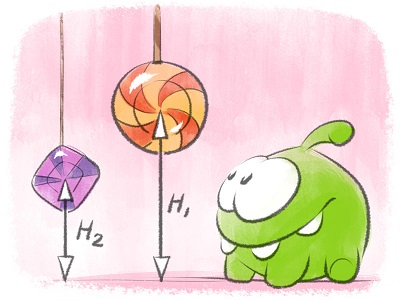The hero of the Cut the Rope game is a little monster named Om Nom. He loves candies. And what a coincidence! He also is the hero of today's problem.

One day, Om Nom visited his friend Evan. Evan has n candies of two types (fruit drops and caramel drops), the i-th candy hangs at the height of hi centimeters above the floor of the house, its mass is mi. Om Nom wants to eat as many candies as possible. At the beginning Om Nom can make at most x centimeter high jumps. When Om Nom eats a candy of mass y, he gets stronger and the height of his jump increases by y centimeters.
What maximum number of candies can Om Nom eat if he never eats two candies of the same type in a row (Om Nom finds it too boring)?
The first line contains two integers, n and x (1 ≤ n, x ≤ 2000) — the number of sweets Evan has and the initial height of Om Nom's jump.
Each of the following n lines contains three integers ti, hi, mi (0 ≤ ti ≤ 1; 1 ≤ hi, mi ≤ 2000) — the type, height and the mass of the i-th candy. If number ti equals 0, then the current candy is a caramel drop, otherwise it is a fruit drop.
Print a single integer — the maximum number of candies Om Nom can eat.
5 3 0 2 4 1 3 1 0 8 3 0 20 10 1 5 5
4
这就easy漏掉一组解。


3 1 0 1 1 1 1 5 0 7 1
#include <iostream>
#include <stdio.h>
#include <math.h>
#include <stdlib.h>
#include <string.h>
#include <algorithm>
const int N = 2100;
using namespace std;
struct node{
int vis,t,h,w;
}g[N];
int cmp(const void *a,const void *b)
{
struct node * X = (struct node *)a;
struct node * Y = (struct node *)b;
return Y->w - X->w;
}
int n,x;
int main()
{
int n,x;
cin>>n>>x;
int xxx = x;
for(int i = 0;i<n;i++)
{
scanf("%d%d%d",&g[i].t,&g[i].h,&g[i].w);
g[i].vis = 0;
}
qsort(g,n,sizeof(g[0]),cmp);
int sum1 = 0,st=0,flag;
for(int ll = 0;ll<n;ll++)
{
for (int k = 0;k < n;k++)
{
if (g[k].vis == 0 && x >= g[k].h)
{
if (st != g[k].t)
{
x += g[k].w;
st = g[k].t;
g[k].vis = 1;
sum1++;
break;
}
}
}
flag = 0;
for(int i = 0;i<n;i++)
{
if(g[i].vis==0 && x>=g[i].h && g[i].t!=st)
flag++;
}
if(flag==0)
break;
}
for(int i = 0;i<n;i++)
g[i].vis = 0;
int sum2 = 0;
st = 1;
for(int ll = 0;ll<n;ll++)
{
for (int k = 0;k < n;k++)
{
if (g[k].vis == 0 && xxx >= g[k].h)
{
if (st != g[k].t)
{
xxx += g[k].w;
st = g[k].t;
g[k].vis = 1;
sum2++;
break;
}
}
}
flag = 0;
for(int i = 0;i<n;i++)
{
if(g[i].vis==0 && xxx>=g[i].h && g[i].t!=st)
flag++;
}
if(flag==0)
break;
}
if(sum1>sum2)
cout<<sum1<<endl;
else
cout<<sum2<<endl;
return 0;
}